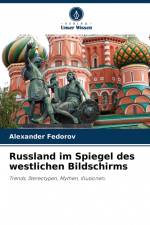von Alexander Fedorov
64,00 €
Jednym z zadä przedstawionych w monografii jest okre¿lenie miejsca i roli tematu ewolucji obrazu Rosji w kinie zachodnim od 1946 roku (pocz¿tek powojennej konfrontacji ideologicznej) do 1991 roku (upadek Zwi¿zku Radzieckiego) na tle trendów wspó¿czesno¿ci (1992-2010); badanie kontekstu politycznego, ideologicznego, spo¿ecznego, kulturowego, g¿ównych etapów rozwoju, kierunków, celów, zadä, autorskich koncepcji interpretacji tego tematu na ekranie zachodnim (amerykäskim, brytyjskim, niemieckim, francuskim, w¿oskim, kanadyjskim); klasyfikacja i analiza porównawcza ideologii, modeli tre¿ci, modyfikacji gatunkowych, stereotypów zachodniej kinematografii zwi¿zanych z interpretacj¿ obrazu Rosji. Monografia zawiera dane cyfrowe zwi¿zane z produkcj¿ i gatunkami zachodnich filmów fabularnych o tematyce rosyjskiej (1946-2010). Dla badaczy nauk politycznych, kulturoznawstwa, filmoznawstwa, kultury medialnej, socjologii, nauczycieli, doktorantów i studentów specjalno¿ci humanitarnych.


